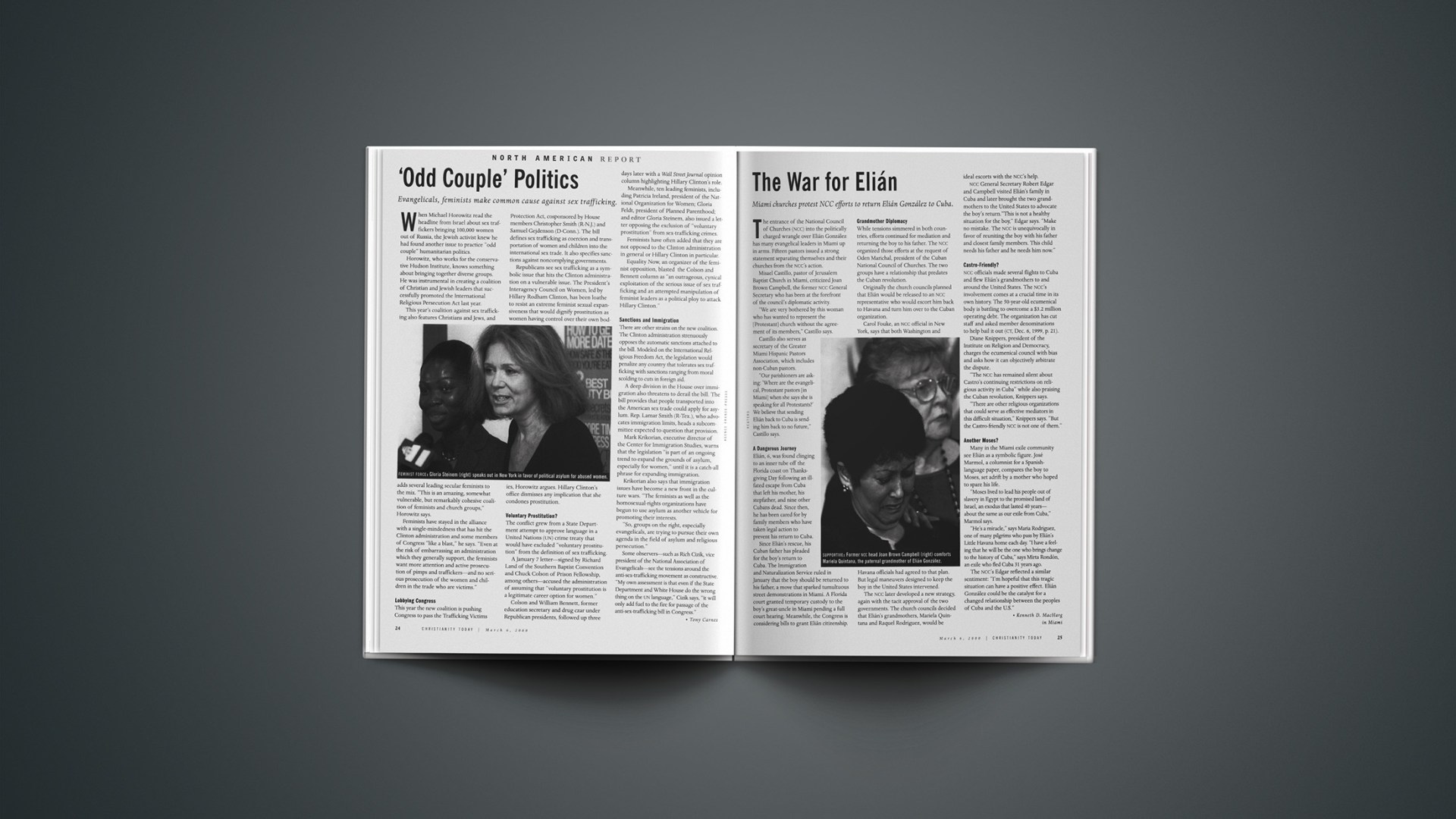When Michael Horowitz read the headline from Israel about sex traffickers bringing 100,000 women out of Russia, the Jewish activist knew he had found another issue to practice ‘odd couple’ humanitarian politics.Horowitz, who works for the conservative Hudson Institute, knows something about bringing together diverse groups. He was instrumental in creating a coalition of Christian and Jewish leaders that successfully promoted the International Religious Persecution Act last year.This year’s coalition against sex trafficking also features Christians and Jews, and adds several leading secular feminists to the mix. “This is an amazing, somewhat vulnerable, but remarkably cohesive coalition of feminists and church groups,” Horowitz says.Feminists have stayed in the alliance with a single-mindedness that has hit the Clinton administration and some members of Congress “like a blast,” he says. “Even at the risk of embarrassing an administration which they generally support, the feminists want more attention and active prosecution of pimps and traffickers—and no serious prosecution of the women and children in the trade who are victims.”
Lobbying Congress
This year the new coalition is pushing Congress to pass the Trafficking Victims Protection Act, cosponsored by House members Christopher Smith (R-N.J.) and Samuel Gejdenson (D-Conn.). The bill defines sex trafficking as coercion and transportation of women and children into the international sex trade. It also specifies sanctions against noncomplying governments.Republicans see sex trafficking as a symbolic issue that hits the Clinton administration where it is vulnerable. The President’s Interagency Council on Women, led by Hillary Rodham Clinton, has been loathe to resist an extreme feminist sexual expansiveness that would dignify prostitution as women having control over their own bodies, Horowitz argues. Hillary Clinton’s office dismisses any implication that she condones prostitution.
Voluntary Prostitution?
The conflict grew from a State Department attempt to approve language in a United Nations crime treaty that would have excluded “voluntary prostitution” from the definition of sex trafficking.A January 7 letter—signed by Richard Land of the Southern Baptist Convention and Chuck Colson of Prison Fellowship, among others—accused the administration of assuming that “voluntary prostitution is a legitimate career option for women.”Colson and William Bennett, former education secretary and drug czar under Republican presidents, followed up three days later with a Wall Street Journal opinion column highlighting Hillary Clinton’s role.Meanwhile, ten leading feminists, including Patricia Ireland, president of the National Organization for Women; Gloria Feldt, president of Planned Parenthood; and editor Gloria Steinem, also issued a letter opposing the exclusion of “voluntary prostitution” from sex-trafficking crimes.Feminists have often added that they are not opposed to the Clinton administration in general or Hillary Clinton in particular.Equality Now, an organizer of the feminist opposition, blasted Colson’s and Bennett’s column as “an outrageous, cynical exploitation of the serious issue of sex trafficking and an attempted manipulation of feminist leaders as a political ploy to attack Hillary Clinton.”
Sanctions and Immigration
There are other strains on the anti-sex-trafficking coalition. The Clinton administration strenuously opposes the automatic sanctions attached to the bill. Modeled on the International Religious Freedom Act, the legislation would penalize any country that tolerates sex trafficking with sanctions ranging from moral scolding to cuts in foreign aid.A deep division in the House over immigration also threatens to derail the bill. The bill provides that people transported into the American sex trade could apply for asylum. Rep. Lamar Smith (R-Tex.), who advocates immigration limits, heads a subcommittee expected to question that provision.Mark Krikorian, executive director of the Center for Immigration Studies, warns that the legislation “is part of an ongoing trend to expand the grounds of asylum, especially for women,” until it is a catch-all phrase for expanding immigration.Krikorian also says that immigration issues have become a new front in the culture wars. “The feminists as well as the homosexual-rights organizations have begun to use asylum as another vehicle for promoting their interests.”So, groups on the right, especially evangelicals, are trying to pursue their own agenda in the field of asylum and religious persecution.”Some observers—such as Rich Cizik, vice president of the National Association of Evangelicals—see the tensions around the anti-sex-trafficking movement as constructive. “My own assessment is that even if the State Department and White House do the wrong thing on the U.N. language,” Cizik says, “it will only add fuel to the fire for passage of the anti-sex-trafficking bill in Congress.”Tony Carnes is Senior News Writer for Christianity Today.
Related Elsewhere
We published a related article, “Alliance Targets Sex Trafficking,” in our August 9, 1999 print issue.”Religion & Ethics Newsweekly,” a PBS television program, also looked at the evangelical-feminist alliance in their September 17, 1999 program. A transcript is available online.The transcript of Charles Colson’s “Breakpoint” radio commentary on the alliance and legalized prostitution is available online, as is the Baptist Press story discussing the January 7 letter signed by Land, Colson, and others.Among newspaper coverage of this issue are a Washington Times editorial and a Washington Post news story.Read the official information about and text of the Trafficking Victims Protection Act.
Copyright © 2000 Christianity Today. Click for reprint information.










